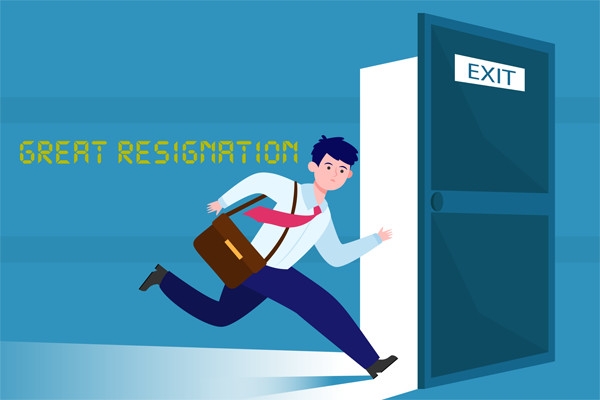“When I look back on all these worries, I remember the story of the old man who said on his deathbed that he had a lot of trouble in his life, most of which had never happened.” - Winston Churchill
Individuals experience certain levels of stress in the course of their life due to various responsibilities that he/she must shoulder either at the workplace or at home. These range from unfavourable live events, sickness, financial strain, or, occupational expectations. At times, it can be encouraging and thus boost performance, but a high level of anxiety can have an adverse impact on one's efficiency, emotional wellbeing and overall health. If an individual encounters stress for a prolonged period, it tends to get chronic.
Every individual constantly attempts to maintain a healthy balance in work and life, and, stressors have an unwanted impact on one's mental and physical health. This can be effortlessly managed by recognising the sources of anxiety and bringing about a few changes in one's lifestyle. It is nothing more than realigning activities in a way that worrisome incidents are unlikely to occur. Stress management cannot be 'one size fits all' as each person is wired differently. Everyone will have different reasons and varying coping techniques.
Let us explore some common ways to achieve an ideal work-life balance:
1. Identify: The first step towards effective management of work is to accept and identify the causes of such an inconvenience. For instance, if an individual has two important tasks to complete, he/she experiences added stress and looks at achieving smaller tasks that require minimal effort and time. While this provides momentary relief, it proves to be harmful in the long run, and, if this cycle keeps repeating itself, it becomes a severe imbalance in work and life. Procrastinating on such activities results in a huge workload to enhance the stress further.
2. Seek Help: If one finds him/herself in a taxing situation owing to work, he/she must seek assistance from an immediate superior or HR manager. There is no shame in reaching out for assistance when warranted to achieve organisational objectives. One should be articulate in communicating concerns and accept guidance on the way forward. If the anxiousness is triggered by factors outside of work, approaching a life coach, a therapist, a close friend or a family member can be useful.
3. Time Management: Getting the day organised by way of creating a structured plan with a set timeline for work and other imperative points of reference can minimise the impact of the accompanying stress. The ability to screen progress will promote a calmer state of mind during the course of the project.
4. Cognitive restructuring: An unpleasant mind state can be detrimental to mental health and hinder employees from performing to their maximum potential. Cognitive restructuring aids in changing distorted thinking that regularly lies behind these moods and enables one to approach circumstances with a more positive attitude.
5. A healthy diet: It is a universally acknowledged fact that good nutrition keeps one mentally and physically healthy. It promotes alertness, sharp thinking and abets the ability to make faster decisions. Maintaining a healthy diet can help both the mind and body to work seamlessly towards achieving the desired results. When the body receives the required supplements and an appropriate diet, the chances of being affected with anxiety are minimal.
6. Exercise: Exercise reduces the levels of stress hormones and stimulates the production of endorphins, the chemicals in the brain that function as the body's natural painkillers and mood elevators. Focusing on a consistent exercise routine enables the body to loosen up and destress. A brisk walk, kick-boxing, yoga, swimming, aerobics, dance or any other similar activity can enable one to focus on the daily routine with a fresh and rejuvenated mind.
7. Good sleep hygiene: Sufficient sleep is vital to allow adequate time for the body to repair and revive, so as to aid in mental sharpness, improved memory, and greater focus, along with boosting the immunity. Going to bed at the right time and eliminating distractions are some of the best practices for a sound and healthy sleep.
8. Incorporate self-care: Taking care of oneself is imperative to achieve an ideal work-life balance. The first step to managing exertion has to come from within as there is only so much others can do to help an individual. Staying hydrated, sleeping sufficiently, pursuing stimulating activities, and, spending quality time with friends and family are some of the best ways to incorporate self-care in the daily routine.
9. Meditate: In the course of the daily routine, the mind can often become cluttered. Through the practice of mindfulness meditation, the mind can become more skilful, attentive and strong, enabling one to better handle the apprehensiveness and demanding situations. Meditation catalyses the alleviation of pressure as it improves cognition and body satisfaction and empowers one to live a calmer life.
10.Cultivate positive emotions: Many individuals tend to unconsciously think about situations and the possible negative outcomes of those. This calls for hassles that can otherwise be avoided. Instead, it is best to inculcate positive thinking and focus on the brighter things in life. Maintaining a gratitude journal and noting down the good incidents can block negative thoughts and reduce anxiety-ridden situations.
Regardless of whether one can manage their problems effectively or not, there will be occasions when stress can get overwhelming. It is important to understand that being stressed is not a shortcoming and is a normal human reaction to work or life pressure. Successful people garner help and support from their peers when there are excessive tasks at hand. While some individuals may go out of their way to help, others might provide a sense of perspective and direction. Each person is entitled to a healthy work-life balance and adopting any methods to achieve it is only natural.

Has COVID-19 forever changed the way we live and work?
Trending
-
SBI General Insurance Launches Digital Health Campaign
-
CredR Rolls Out 'Life Happens' Leave For Its Employees
-
Meesho Announces 30-Week Gender-Neutral Parental Leave Policy
-
Microsoft Unveils Tech Resilience Curriculum To Foster An Inclusive Future
-
60% Indian Professionals Looking For Job Change Due To COVID: Survey
-
SpringPeople And Siemens Collaborate For Digital Transformation Push
-
86% Professionals Believe Hybrid Work Is Essential For Work Life Balance: Report
-
Almost 1 In Every 3 People's Personal Life Affected Due To Work Stress
-
Meesho Rolls Out Reset And Recharge Policy For Employees
-
80% Of Talent Leaders & Academics Say Pandemic Changed Skill Needs For Youth: Report
-
Hero Electric Rolls Out 'Hero Care' Program For Employees
-
Human Capital In Collaboration With ASSOCHAM Hosts Virtual Conference
-
IKEA India, Tata STRIVE Collaborate To Create Employability And Entrepreneurship Opportunities
-
SAP India, Microsoft Launch Tech Skilling Program for Young Women
-
DXC Technology, NASSCOM Collaborate For Employability Skills Program
-
Lenskart To Hire Over 2000 Employees Across India By 2022
-
Mindtree Launches Learn-and-Earn Program
-
Tata AIA Extends 'Raksha Ka Teeka' To Its Employees
-
Swadesh Behera Is The New CPO Of Titan
-
NetConnect Global Plans To Recruit 5000 Tech Professionals In India
-
Hubhopper Plans To Hire 60% Of Indian Podcasters By 2022
-
Corporate India Needs More Women In Leadership Roles: Report
-
Aon to Invest $30 Million and Create 10,000 Apprenticeships by 2030
-
Tech Mahindra Launches ‘Gift a Career’ Initiative for Upskilling of Youth
-
40% Women Prefer Flexible Working Options in Post-COVID World: Survey
-
3 out of 4 companies believe they can effectively hire employees virtually: Report
-
Vodafone , CGI and NASSCOM Foundation launch digital skills platform
-
Odisha: Bank, postal employees to deliver cash for elderly, differently-abled persons
-
Skill India launches AI-based digital platform for "Skilled Workforce"
-
Hiring activity declines 6.73% in first quarter: Survey
-
70% startups impacted by COVID-19 pandemic
-
Bajaj Allianz Life ropes in Santanu Banerjee as CHRO
-
Over 70 Percent MSMEs look at cutting jobs to sustain businesses
-
93 Per Cent employees stressed about returning to office post-lockdown
-
Johnson & Johnson India announces family benefits for same gender partners
-
Indian firms turning friendly towards working mothers
-
Welspun India names Rajendra Mehta as new CHRO
-
Wipro partners with NASSCOM to launch Future Skills platform



Human Capital is niche media organisation for HR and Corporate. Our aim is to create an outstanding user experience for all our clients, readers, employers and employees through inspiring, industry-leading content pieces in the form of case studies, analysis, expert reports, authored articles and blogs. We cover topics such as talent acquisition, learning and development, diversity and inclusion, leadership, compensation, recruitment and many more.
Subscribe Now












































Comment